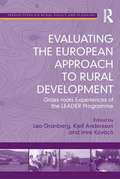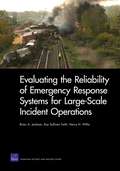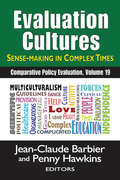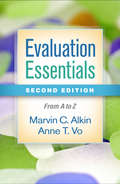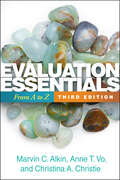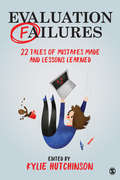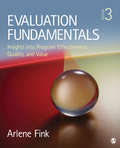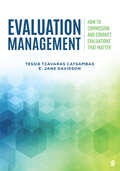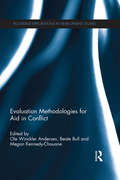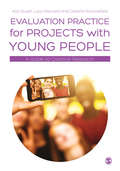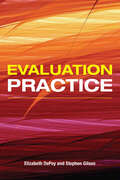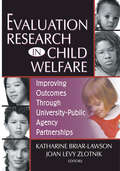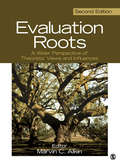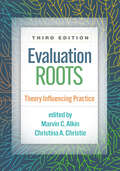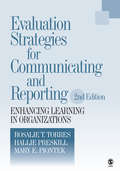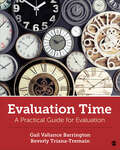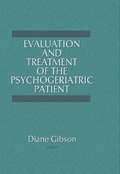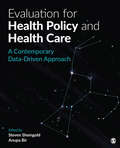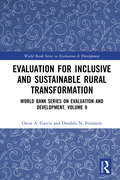- Table View
- List View
Evaluating the European Approach to Rural Development: Grass-roots Experiences of the LEADER Programme (Perspectives on Rural Policy and Planning)
by Kjell Andersson Leo GranbergThe LEADER programme, initiated in 1991, aims to improve the development potential of rural areas in the European Union by drawing on local initiatives and skills. Highlighting this unique policy approach, this book presents up-to-date research results on LEADER’s achievements and restrictions at the local level in a comparative way in order to discuss its merits and problems. What makes LEADER important is not only that it has a major role in rural development efforts, but also that it has a pioneering role in the new type of governance, participatory democracy. Asking whether LEADER strengthens local democracy or not, this book also looks at how it affects the power balance among stakeholders, between national and local actors and between genders. It questions whether LEADER projects are genuinely grass-root level activities, reflecting local needs and ideals; and if the approach brings local know-how back onto the development agenda in innovations and development activities. Finally, the authors examine the success of dissemination of knowledge within the LEADER programme to other regions.
Evaluating the Reliability of Emergency Response Systems for Large-Scale Incident Operations
by Henry H. Willis Brian A. Jackson Kay Sullivan FaithThe ability to measure emergency preparedness is critical for policy analysis in homeland security. Yet it remains difficult to know how prepared a response system is to deal with large-scale incidents, whether it be a natural disaster, terrorist attack, or industrial or transportation accident. This volume describes a method, based on the concept of system reliability, for evaluating the preparedness of emergency response systems.
Evaluation Cultures: Sense-Making in Complex Times (Comparative Policy Evaluation Ser.)
by Penny Hawkins Jean-Claude BarbierEvaluation Cultures draws upon a sample of reflections, drawn from organizational practices, nationally centered political cultures, and ethnic cultures, as a framework for understanding how culture influences the work of evaluation. Two main conclusions seem to emerge: first, that there exists no single, uniform, and homogenous national evaluation culture; second, that the idea of a unified transnational culture of evaluation is an illusion.The evaluation community includes a diverse group of professionals; a diversity that is not just represented in national or ethnic culture but also in academic backgrounds, public and private sector allegiances, and personal character. The contributors to this book represent, in part, this diversity by reflecting a range of views.Evaluation Cultures draws upon the experience of senior evaluation practitioners, who share their reflections on their practice and experience, in order to put forth challenges to purely academic analysis. Evaluation Cultures presents a consistent, if not exhaustive, attempt to give analytical and empirical sense to all of the cultures of the evaluation community.
Evaluation Essentials, Second Edition: From A to Z
by Marvin C. Alkin Anne T. VoThoroughly revised and updated, this engaging text has given thousands of students and new evaluators the practical information and expert advice needed to conduct or use evaluations. In 26 concise sections, the book describes how to articulate answerable evaluation questions, collect and analyze data using both quantitative and qualitative methods, and deal with contingencies that might alter the traditional sequence of an evaluation. Special strengths of the text are its attention to individual, organizational, and community culture and emphasis on building collaborative relationships with stakeholders. An in-depth case study and related end-of-section exercises (including group activities) help students put themselves in the evaluator role. Other pedagogical features include section titles written as questions, bulleted recaps of each section, "Thinking Ahead" and "Next Steps" pointers, cautionary notes, and suggestions for further reading. New to This Edition *New and expanded topics: evaluation contracts, budgeting, surveys, data visualization, qualitative coding and memoing, factors affecting evaluation use, and context-sensitive evaluation. *Revised case study with extended exercises that guide the reader to complete a simulated evaluation. *End-of-section "Quick Read" links to recommended American Evaluation Association blog posts. *Four entirely new sections (such as "How Do You Strengthen Relationships with Stakeholders?" and "How Do We Plan a Process-Focused Evaluation Design?"), plus other changes and additions throughout.
Evaluation Essentials: From A to Z
by Christina A. Christie Marvin C. Alkin Anne T. VoBeloved for its conversational style and reliable advice, this text is now in a revised and updated third edition, reflecting key developments in evaluation. It includes expanded coverage of equity and social justice issues, values and cost analysis, visualizing qualitative data with software, and more. Twenty-six concise chapters, or "sessions," give students, applied researchers, and program administrators a solid foundation for conducting or using evaluations. Covering both quantitative and qualitative methods, the book emphasizes fostering evaluation use. It shows how to build collaborative relationships with users; formulate answerable evaluation questions; deal with contingencies that might alter the traditional sequence of an evaluation; and collect, analyze, and report data. Student-friendly features throughout the sessions include titles written as questions, bulleted recaps, "Thinking Ahead" and "Next Steps" pointers, cautionary notes, and annotated suggestions for further reading. An in-depth case study provides the basis for end-of-session practice exercises. New to This Edition *New sessions on context-sensitive evaluation, including the organizational, sociopolitical, and community contexts of a program. *New or expanded discussions of timely topics: identifying evaluation decision makers, analyzing program costs, coding and visualizing qualitative data with software, and more. *Updated suggestions for further reading and discussion in every chapter.
Evaluation Failures: 22 Tales of Mistakes Made and Lessons Learned
by Kylie Hutchinson"This is the evaluation book we′ve been waiting for! A must-read for all learning and working in the field." –Amanda M. Olejarski, West Chester University Evaluation Failures: 22 Tales of Mistakes Made and Lessons Learned is a candid collection of stories from seasoned evaluators from a variety of sectors sharing professional mistakes they have made in the past, and what they learned moving forward. As the only book of its kind, editor Kylie Hutchinson has collected a series of engaging, real-life examples that are both entertaining and informative. Each story offers universal lessons as takeaways, and discussion questions for reflective practice. The book is the perfect companion to anyone working in the evaluation field, and to instructors of program evaluation courses who want to bring the real world into their classroom.
Evaluation Failures: 22 Tales of Mistakes Made and Lessons Learned
by Kylie Hutchinson"This is the evaluation book we′ve been waiting for! A must-read for all learning and working in the field." –Amanda M. Olejarski, West Chester University Evaluation Failures: 22 Tales of Mistakes Made and Lessons Learned is a candid collection of stories from seasoned evaluators from a variety of sectors sharing professional mistakes they have made in the past, and what they learned moving forward. As the only book of its kind, editor Kylie Hutchinson has collected a series of engaging, real-life examples that are both entertaining and informative. Each story offers universal lessons as takeaways, and discussion questions for reflective practice. The book is the perfect companion to anyone working in the evaluation field, and to instructors of program evaluation courses who want to bring the real world into their classroom.
Evaluation Fundamentals: Insights into Program Effectiveness, Quality, and Value
by Arlene G. FinkThe Third Edition of Arlene Fink’s Evaluation Fundamentals teaches the basic concepts and vocabulary necessary to do program evaluations and review the quality of evaluation research to make informed decisions about methods and outcomes to meet scientific and community needs. Dr. Fink thoroughly examines such issues as how to justify evaluation questions and set standards of effectiveness, design studies, identify best practices, and conduct ethical research. The book contains numerous examples of evaluation methods, as well as evaluation reports. It also includes practice exercises and suggested readings in print and online. Individuals can use the New Edition successfully on their own or in small or large groups.
Evaluation Fundamentals: Insights into Program Effectiveness, Quality, and Value
by Arlene G. FinkThe Third Edition of Arlene Fink’s Evaluation Fundamentals teaches the basic concepts and vocabulary necessary to do program evaluations and review the quality of evaluation research to make informed decisions about methods and outcomes to meet scientific and community needs. Dr. Fink thoroughly examines such issues as how to justify evaluation questions and set standards of effectiveness, design studies, identify best practices, and conduct ethical research. The book contains numerous examples of evaluation methods, as well as evaluation reports. It also includes practice exercises and suggested readings in print and online. Individuals can use the New Edition successfully on their own or in small or large groups.
Evaluation Management: How to Commission and Conduct Evaluations that Matter
by Anastasia (Tessie) Catsambas E. Jane DavidsonEvaluation Management: How to Commission and Conduct Evaluations that Matter helps evaluation teams and commissioners achieve results that meet utilization and organizational learning goals and inform positive change for programs and communities. Tessie Tzavaras Catsambas and E. Jane Davidson provide insights on both the tactical and strategic levels of evaluation management, using approaches and skills from project management, administration and logistics, budgeting, team management, leadership development, communication, coaching, systems thinking, and negotiation. They also demonstrate how intentionality for equity, sustainability and culturally responsive practices is essential for ensuring an evaluation’s relevance and enhancing productive stakeholder engagement. With plenty of practical guidance from many years of experience, the authors provide a valuable resource for student readers, experienced evaluators, and commissioners of evaluation.
Evaluation Management: How to Commission and Conduct Evaluations that Matter
by Anastasia (Tessie) Catsambas E. Jane DavidsonEvaluation Management: How to Commission and Conduct Evaluations that Matter helps evaluation teams and commissioners achieve results that meet utilization and organizational learning goals and inform positive change for programs and communities. Tessie Tzavaras Catsambas and E. Jane Davidson provide insights on both the tactical and strategic levels of evaluation management, using approaches and skills from project management, administration and logistics, budgeting, team management, leadership development, communication, coaching, systems thinking, and negotiation. They also demonstrate how intentionality for equity, sustainability and culturally responsive practices is essential for ensuring an evaluation’s relevance and enhancing productive stakeholder engagement. With plenty of practical guidance from many years of experience, the authors provide a valuable resource for student readers, experienced evaluators, and commissioners of evaluation.
Evaluation Methodologies for Aid in Conflict (Routledge Explorations in Development Studies)
by Ole Winckler Andersen Beate Bull Megan Kennedy-ChouaneKnowledge and rigorous evidence around the role of external development partners in situations of conflict and fragility is still lacking. There is little accountability for the billions in aid being spent in places like Afghanistan, Iraq and the Democratic Republic of Congo. This book analyses evaluation theory and practice in order to help fill this knowledge gap and advocates a realistic and rigorous approach to evaluating international engagement. Through a series of case studies, this book highlights both the promise, and potential pitfalls, of taking a more evaluative approach to understanding aid in conflict regions. These illustrate the methodological and analytical approach taken by researchers working to understand the results and effectiveness of conflict prevention and peacebuilding support. While well-grounded in current theoretical and methodological debates, the book provides valuable practical information by examining how and why different choices were made in the context of each evaluation. The book shows what future steps may be envisaged to further strengthen evaluations of support for conflict prevention and peacebuilding. The analysis draws on a wealth of perspectives and voices to provide researchers and students in development studies and conflict and peace studies as well as development evaluators with a deep and broad understanding of evaluation methods and approaches.
Evaluation Practice for Projects with Young People: A Guide to Creative Research
by Lucy Maynard Caroline Rouncefield Kaz StuartThis straightforward and original text sets out best practice for designing, conducting and analysing research on work with young people. A creative and practical guide to evaluation, it provides the tools needed to bridge the gap between theoretical knowledge and applied practice. Written by an experienced, erudite team of authors this book provides clear, pragmatic advice that can be taken into the classroom and the field. The book: Provides strategies for involving young people in research and evaluation Showcases creative and participatory methods Weaves a real world project through each chapter, highlighting challenges and opportunities at each stage of an evaluation; readers are thus able to compare approaches Is accompanied by a website with downloadable worksheets, templates and videos from the authors This is the ideal text for postgraduate students and practitioners who work with young people in the statutory and voluntary sectors.
Evaluation Practice for Projects with Young People: A Guide to Creative Research
by Lucy Maynard Caroline Rouncefield Kaz StuartThis straightforward and original text sets out best practice for designing, conducting and analysing research on work with young people. A creative and practical guide to evaluation, it provides the tools needed to bridge the gap between theoretical knowledge and applied practice. Written by an experienced, erudite team of authors this book provides clear, pragmatic advice that can be taken into the classroom and the field. The book: Provides strategies for involving young people in research and evaluation Showcases creative and participatory methods Weaves a real world project through each chapter, highlighting challenges and opportunities at each stage of an evaluation; readers are thus able to compare approaches Is accompanied by a website with downloadable worksheets, templates and videos from the authors This is the ideal text for postgraduate students and practitioners who work with young people in the statutory and voluntary sectors.
Evaluation Practice: How To Do Good Evaluation Research In Work Settings
by Elizabeth DePoy Stephen GilsonEvaluation Practice bridges the apparent gap between practice and research to present a logical, systematic model to guide all professional thinking and action within the context of everyday professional life. Their framework embraces diverse theories, action, and sets of evidence from a range of professional and disciplinary perspectives.
Evaluation Research in Child Welfare: Improving Outcomes Through University-Public Agency Partnerships
by Katharine Briar-Lawson Joan Levy ZlotnikSince the 1980s, child welfare agencies and social work programs in more than 40 states have come together to address recruitment and retention issues by preparing social work students for child welfare practice-and to enhance the delivery of child welfare services. This book documents the outcomes of these partnerships to help you assess their value and sustainability! Evaluation Research in Child Welfare: Improving Outcomes Through University-Public Agency Partnerships is a critical examination of the diverse outcomes-and strategies for assessing them-of university/public child welfare agency partnerships designed to prepare social work students for public child welfare practice. This informative book addresses outcomes of these specialized training efforts which were supported by federal Title IV-E and Title IV-B Section 426 funds. Special attention is paid to programs addressing diversity and cultural competence through staff development. The book follows the process of tracking the career paths of students in several states (large and small, rural and urban), as well as cross-state collaborations that include university, agency, consumer, and student partnerships. From the Editors: "Rising drug problems such as crack and cocaine addiction, along with co-occurring challenges such as poverty, domestic violence, and mental health issues, have helped to reinforce the need to have the most effective services delivered by the most well-prepared staff. Moreover, such challenges compel the most relevant, scientifically based approaches, requiring a closer connection of public child welfare systems to social work education programs and related academic disciplines. The articles featured in this book serve as progress markers for this re-professionalization initiative. They constitute snapshots of some of the current progress in workforce development, including social work based education, training, and capacity building in public child welfare. They also reflect social work/public child welfare partnerships and the lessons that are being learned when the research, educational, and service resources of schools of social work are harnessed to build a better trained work force that can provide improved services." In this informative book, you'll find a national overview of historical efforts to promote professional social work practice in child welfare, as well as examinations of: special challenges presented by privatized systems curricula and agencies training opportunities that grow from research partnerships the importance and impact of racial and ethnic diversity for future social workers the cultural competency needs of BSW and MSW students the differing cultural perspectives of universities and agencies-which must be bridged to create successful partnerships the benefits of these partnerships in terms of outcomes for students, clients, agencies, and social work education programs
Evaluation Roots: A Wider Perspective of Theorists’ Views and Influences
by Marvin C. AlkinEvaluation Roots: A Wider Perspective of Theorists’ Views and Influences, Second Edition provides an updated examination of current evaluation theories and traces their evolution. Marvin C. Alkin shows how theories build upon theories and how the theories are related to each other. The way in which these evaluation "roots" grew to form a tree helps to provide a better understanding of evaluation theory. In addition to the editor's overview, the book contains essays by leading evaluation theorists. In these pieces, the evaluators comment on their own development and give their views of their placement upon the tree. **All royalties from sales of this book are donated to support the AEA Research on Evaluation Student Award.**
Evaluation Roots: Theory Influencing Practice
by Christina A. Christie Marvin C. AlkinShowing how evaluation practice looks when guided by theory, the third edition of the influential "theory tree" book is significantly revised with over 80% new material, including a greater focus on equity and theories over theorists. Chapters from leading authorities describe the goals of each theory; the type of evaluation for which it is appropriate (formative, summary formative, summative, adaptive); the size of the program for which it is most applicable; specific prescriptions; and observable actions that help to define the theory. Readers are given the tools to select suitable approaches for the size, contexts and stage of an evaluation and their own personal values. New to This Edition *Chapters on culturally responsive evaluation, Indigenous evaluation, and developmental evaluation. *Organized around theories rather than individual theorists. *Increased attention to practical applications, including a chapter distilling the goals, methods, and standards of evaluations based on each theory. *Case study chapter on the role of theory in evaluation policy.
Evaluation Strategies for Communicating and Reporting: Enhancing Learning in Organizations
by Hallie Preskill Dr Rosalie T. Torres Mary E. PiontekEvaluation Strategies for Communicating and Reporting has been thoroughly revised and updated creating 75% new material and 34 new case examples. The Second Edition provides worksheets and instructions for creating a detailed communicating and reporting plan based on audience needs and characteristics. Authors Rosalie T. Torres, Hallie Preskill, and Mary E. Piontek cover advances in technology including Web site communications, Web and videoconferencing, and Internet chat rooms. Also mentioned are several additional topics for consideration, including communicating and reporting for diverse audiences and for multi-site evaluations.
Evaluation Time: A Practical Guide for Evaluation
by Gail V. Barrington Beverly F. Triana-TremainThis book is an accessible, contemporary, and comprehensive guide to the concepts and practice of evaluation. Authors Gail Vallance Barrington and Beverly Triana-Tremain integrate new approaches and concerns, and classic frameworks with practical tools that readers can use to design evaluation studies. They show how evaluators measure whether the planned and implemented interventions or services are achieving their goals and objectives, while focusing on the questions most important to the community and organizations in which the evaluation takes place. The book stresses the role of critical and evaluative thinking, as well as self-reflection, and demonstrates the importance of context and equity in today’s turbulent environment, offering a new stance for evaluators to support global as well as local issues.
Evaluation Time: A Practical Guide for Evaluation
by Gail V. Barrington Beverly F. Triana-TremainThis book is an accessible, contemporary, and comprehensive guide to the concepts and practice of evaluation. Authors Gail Vallance Barrington and Beverly Triana-Tremain integrate new approaches and concerns, and classic frameworks with practical tools that readers can use to design evaluation studies. They show how evaluators measure whether the planned and implemented interventions or services are achieving their goals and objectives, while focusing on the questions most important to the community and organizations in which the evaluation takes place. The book stresses the role of critical and evaluative thinking, as well as self-reflection, and demonstrates the importance of context and equity in today’s turbulent environment, offering a new stance for evaluators to support global as well as local issues.
Evaluation and Treatment of the Psychogeriatric Patient
by Diane GibsonThis pertinent book assists occupational therapists and other health care providers in developing up-to-date psychogeriatric programs and understanding details of treating the cognitively impaired elderly. There exists a significant demand for occupational therapy in psychogeriatrics now. As the elderly population increases, especially elderly requiring rehabilitative care, the need for occupational therapy in psychogeriatrics will increase markably. Evaluation and Treatment of the Psychogeriatric Patient emphasizes the expertise of leading psychogeriatric occupational therapists, focusing on transitional programming, treating cognitive deficits, and recognizing the malignant cultural myths which continue to disenfranchise and denigrate the elderly.Appropriate diagnosis and management of the elderly population is vital to their ability to function independently. Through detailed, operationally useful descriptions of current geriatric day care hospitals and psychogeriatric transitional programs, this book will be an invaluable aid for social workers, nurses, geriatric counselors, and physical therapists. These helping professionals will be better equipped to develop up-to-date psychogeriatric programs and will better understand the details involved in treating the mentally impaired elderly.
Evaluation for Health Policy and Health Care: A Contemporary Data-Driven Approach
by Anupa Bir Steven SheingoldThis is the contemporary, applied text on evaluation that your students need. Evaluation for Health Policy and Health Care: A Contemporary Data-Driven Approach explores the best practices and applications for producing, synthesizing, visualizing, using, and disseminating health care evaluation research and reports. This graduate-level text will appeal to those interested in cutting-edge health program and health policy evaluation in this era of health care innovation. Editors Steven Sheingold and Anupa Bir’s core text focuses on quantitative, qualitative, and meta-analytic approaches to analysis, providing a guide for both those executing evaluations and those using the data to make policy decisions. It is designed to provide real-world applications within health policy to make learning more accessible and relevant, and to highlight the remaining challenges for using evidence to develop policy.
Evaluation for Health Policy and Health Care: A Contemporary Data-Driven Approach
by Anupa Bir Steven SheingoldThis is the contemporary, applied text on evaluation that your students need. Evaluation for Health Policy and Health Care: A Contemporary Data-Driven Approach explores the best practices and applications for producing, synthesizing, visualizing, using, and disseminating health care evaluation research and reports. This graduate-level text will appeal to those interested in cutting-edge health program and health policy evaluation in this era of health care innovation. Editors Steven Sheingold and Anupa Bir’s core text focuses on quantitative, qualitative, and meta-analytic approaches to analysis, providing a guide for both those executing evaluations and those using the data to make policy decisions. It is designed to provide real-world applications within health policy to make learning more accessible and relevant, and to highlight the remaining challenges for using evidence to develop policy.
Evaluation for Inclusive and Sustainable Rural Transformation: World Bank Series on Evaluation and Development, Volume 9 (World Bank Series on Evaluation & Development)
by Oscar A. García Osvaldo N. FeinsteinWritten by a team of expert practitioners at the Independent Office of Evaluation of IFAD, this book gives an overview of evaluation practice at IFAD. It looks at how evaluation practice has evolved to reflect, respond to and inform changing expectations of development assistance. It reveals how evaluation products and methodologies have benefited from key reviews, revisions and lessons learned, and also how they have progressively strengthened IFAD’s capacity to assess its operations and better understand its results. The book concludes with reflections on some of the challenges that lie ahead, including how the independent evaluation function can continue to evolve to meet future challenges and enhance the impact of development initiatives on people’s lives. This valuable insight into practice will be of interest to researchers, practitioners and policymakers in development economics, development studies and rural studies.
